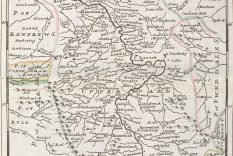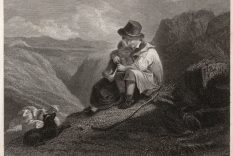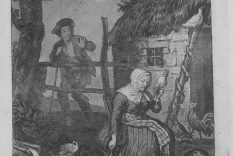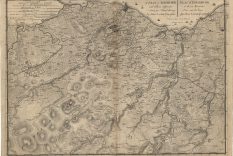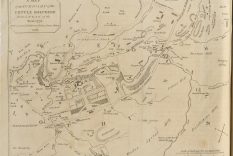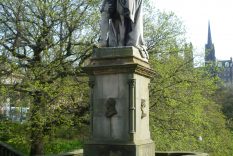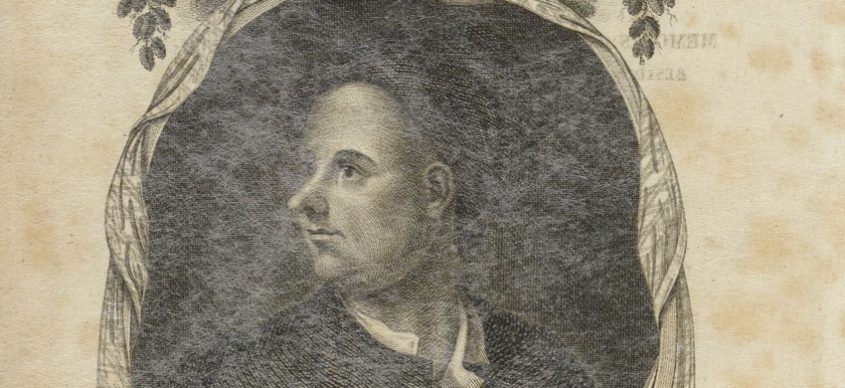
Hailin frae the uplands o Lanarkshire, Allan Ramsay, darger, herd, weegmaker, buikseller an poet, is a vital link in the chyne o Scots literatur.
He wis said tae hae been influenced durin his bairnheed bi fireside tales an bi Middle Scots makars Henrysoun and Dunbar, whase poems wid feature in broadsides hawked aroond the Scottish kintra ootthrou the late 17th an early 18th centuries.
Throu his ain broadsides an prentit volumes Ramsay popularised early Modren Scots, pavin the wey fir later poets Fergusson an Burns. In his pastoral drama ‘The Gentle Shepherd’, Ramsay’s maist acclaimed wark, he reached a braid readership in Britain an wis respectit bi Alexander Pope.
Ramsay wis whummelt in his efforts tae rekinnle theatrical entertainment in Edinburgh, which frae the 17th century on had been strangly compesced bi kirk authority. Ramsay screivit a hantle o popular animal fables an is creeditit wi stairtin up the first circulatin leebrar in Scotland.
Lear mair aboot Allan Ramsay (1686-1758)
Born at Leadhills in 1686, upon the daith o his faither an wi his faimily facin haurdship, this early period in Ramsay’s life saw him trauchlin alangside local bairns at the Leadhills mines, dargin at the waashin an buskin o leid ore fir the smeltin process.
‘The Life of Ramsay’ which prefaces the 1808 edition o ‘The gentle shepherd; A pastoral comedy’, ceets Ramsay spendin his younkers as a herd amang the muirlands o Sooth Lanarkshire, aiblins a valuable experience that won him insichts intil the mainners an customs o Scottish kintra life that are tae be foond in ‘The gentle shepherd’.
In 1701 Ramsay flittit tae Edinbrugh whaur he wis prenticed as a weegmaker. Bi 1712, Ramsay’s easy-gaun an joco natur made him a kenspeckle figure amang the club rooms an oyster hooses o the capital, whaur he wid become a member o The Easy Club. He wis awned intae the fauld eftir recitation o his rhymin address ‘the Most Happy Members of the Easy Club.’
Wi Ramsay’s verse winnin popularity through his prentit broadsides, his octavo volume ‘The poems of Alan Ramsay’ then brocht him fower hunder guineas. This wis a muckle sum fir a risin poet as Ramsay musit on the pecuniary advantages o workin as baith poet an weegmaker:
‘Theek the out, and line the inside
Of mony a douse and witty pash
And baith ways gather in the cash’
Bi 1725 Ramsay’s statit profession wis bukeseller. In the same year he imprentit his pastoral drama ‘The gentle shepherd’ which met wi braw success. It wis frae his bukeshop in Edinbrugh that Ramsay wid set up Scotland’s first circulatin leebrar.
Wi the success o ‘The gentle shepherd’, Ramsay ettlet at his ain expense tae set up o a playhoose in Carrubers Close in Edinbrugh. This wis a projeck which wid meet wi ill-favour frae the dour Holy Wullies an magistrates o Auld Reekie. It wid lead tae an ironic satire bein scrievit forenenst Ramsay cried ‘The Flight of Religious Piety From Scotland Upon the Account of Ramsay’s Lewd Books’, as weel as the ‘Hell-bred Playhouse Comedians Who Debauched All the Faculties of the Soul of Our Rising Generation.’
Ramsay respondit tae the renaigin o his theatre licence bi scrievin his ‘Appeal to the Court of Session’ in Scots verse. Unsuccessful in reversin the verdick, the closure o the Carrubers Close playhoose wid increase Ramsay’s financial waes.
Ramsay scrievit a guid hantle o sangs, poetry, an satires. Atween 1722 an 1730 he follaed in the earlier European tradition o Robert Henrysoun whan he owerset 14 animal fables intae Scots.
Ramsay wis gien braw opportunity tae reenge through a rowth o Scots literatur whan, accordin tae biographer Oliphant Smeaton:
‘Ramsay had been granted access to the Bannatyne Manuscripts – the literary remains of George Bannatyne, poet, antiquarian, and collector of ancient manuscripts of Scottish poetry. From this priceless treasure trove he drew specimens of Dunbar, Henrysoun, Alexander Scott, Lyndsay, Kennedy, Montgomery, Sempill, Gavin Douglas and others.’
As Ramsay ettlet tae re-kinnle interest in earlier Scots poetry, his engagement wi aulder Scots literature led tae his ‘Tea table miscellany; A collection of Scots sangs marrying of new words to existing tunes as old as the days of James V’, an tae his publication o ‘The ever green’.
Aroond three months eftir Ramsay’s death in Janwar 1758, ‘The gentle shepherd’ wis at least enjyin the prospeck o a run at the Edinbrugh Theatre Royal. Houanivir, aiblins due tae the interruption in Scottish theatre, gart whiles redundant bi the draconian meisurs o the civic high-heidyins, jalousin bi the playbill thair appear tae hae been gey few natural Scots-speakin actors tae tak up the roles:
‘April 29 1758: First night: The Gentle Shepherd: The characters to be dressed in the Scotch dress …
NB: – The utmost care and application has been taken to learn the Scots dialect in this piece as perfectly as possible, that the beauty of this excellent pastoral may receive as much justice as is in the performers to give it.’
Ramsay’s contribution tae the Scots leid an literatur is inestimable an the Leebrar hauds mony copies o Ramsay’s warks.
Originally from the uplands of Lanarkshire, Allan Ramsay, labourer, shepherd, wigmaker, bookseller and poet, is a vital link in the chain of Scots literature.
He was said to have been influenced during his childhood by fireside tales and by Middle Scots poets Henrysoun and Dunbar, whose poems would feature in broadsides hawked around the Scottish countryside throughout the late 17th and early 18th centuries.
Through his own broadsides and published volumes Ramsay popularised early Modern Scots, paving the way for later poets Fergusson and Burns. In his pastoral drama ‘The Gentle Shepherd’, Ramsay’s most acclaimed work, he reached a wide readership in Britain and was admired by Alexander Pope.
Ramsay was thwarted in his efforts to revitalise theatrical entertainment in Edinburgh, which from the mid 17th century on had been strongly repressed by church authority. Ramsay wrote a number of popular animal fables and is credited with starting up the first circulating library in Scotland.
Learn more about Allan Ramsay (1686-1758)
Born at Leadhills in Lanarkshire in 1686, on the death of his faither and with his family facing hardship, this early period in Ramsay’s life saw him struggling alongside local children at the Leadhills mines labouring at the washing and preparation of lead ore for smelting.
‘The life of Ramsay’ which prefaces the 1808 edition of ‘The gentle shepherd, A Pastoral Comedy’, cites Ramsay as spending his youth as a shepherd among the moorlands of South Lanarkshire. This was possibly a valuable experience that helped him gain insights into the manners and customs of Scottish country life that are to be found in ‘The gentle shepherd’.
In 1701 Ramsay moved to Edinburgh where he was apprenticed as a wigmaker. By 1712, Ramsay’s easy-going and convivial nature made him a recognisable figure among the club rooms and oyster houses of the capital, where he would become a member of The Easy Club. He was admitted into the fold by the reciting of his rhyming address ‘the Most Happy Members of the Easy Club.’
With Ramsay’s poetry gaining popularity through his printed broadsides, his octavo volume ‘The poems of Alan Ramsay’ then brought him four hundred guineas. This was a highly significant sum for a rising poet and Ramsay mused on the pecuniary advantages of working simultaneously as poet and wigmaker:
‘Theek the out, and line the inside
Of mony a douse and witty pash
And baith ways gather in the cash’
By 1725 Ramsay’s stated profession was bookseller. In the same year he published his pastoral drama ‘The gentle shepherd’ which met with considerable success. It was from his bookshop in Edinburgh that Ramsay would set up Scotland’s first circulating library.
With the success of ‘The sentle shepherd’, Ramsay undertook, at his own expense, the setting-up of a playhouse in Carrubers Close in Edinburgh. This was a project which would meet with ill-favour from the dour ‘Holy Willies’ and magistrates of Auld Reekie. It would lead to an ironic satire being penned against Ramsay called ‘The Flight of Religious Piety From Scotland Upon the Account of Ramsay’s Lewd Books, as well as the ‘Hell-bred Playhouse Comedians Who Debauched All the Faculties of the Soul of Our Rising Generation.’
Ramsay responded to the revocation of his theatre licence by writing his ‘Appeal to the Court of Session’ in Scots verse. Unsuccessful in reversing the verdict, the closure of the Carrubers Close playhouse would increase Ramsay’s financial woes.
Ramsay wrote a good number of songs, poetry, and satires. Between 1722 and 1730 he followed in the earlier European tradition of Robert Henrysoun when he translated 14 animal fables into Scots.
Ramsay was given fine opportunity to search through a wealth of Scots literature when, according to biographer Oliphant Smeaton:
‘Ramsay had been granted access to the Bannatyne Manuscripts – the literary remains of George Bannatyne, poet, antiquarian, and collector of ancient manuscripts of Scottish poetry. From this priceless treasure trove he drew specimens of Dunbar, Henrysoun, Alexander Scott, Lyndsay, Kennedy, Montgomery, Sempill, Gavin Douglas and others.’
As Ramsay strove to re-ignite interest in earlier Scots poetry, his engagement with older Scots literature resulted in his ‘Tea table miscellany;A collection of Scots sangs marrying of new words to existing tunes as old as the days of James V’, and in his publication of ‘The ever green’.
Some three months after Ramsay’s death in January 1758, ‘The gentle shepherd’ was at least enjoying the prospect of a run at the Edinburgh Theatre Royal. However, possibly due to the interruption in Scottish theatre, made redundant for a time from the draconian measures of the civic authorities, judging by the playbill there appear to have been a dearth of natural Scots-speaking actors to take up the roles:
‘April 29 1758: First night: The Gentle Shepherd: The characters to be dressed in the Scotch dress …
NB:- The utmost care and application has been taken to learn the Scots dialect in this piece as perfectly as possible, that the beauty of this excellent pastoral may receive as much justice as is in the performers to give it.’
Ramsay’s contribution to Scots language and literature is inestimable and the Library holds many copies of Ramsay’s works .
- Author:
- Alan Ramsay (1686-1758)
- Publication Date:
- 1725
- Imprentit:
Embra
‘The Twa Lizards’
Beneath a tree, ae shining day,
On a burn-bank twa Lizards lay,
Beeking themsells now in the beams,
Then drinking of the caller streams,
Wae’s me says ane o them to th’ither,
How mean and silly live we brither?
Beneath the moon, is ought sae poor!
Regardless less, or mair obscure!Frae ‘The Twa Lizards’


